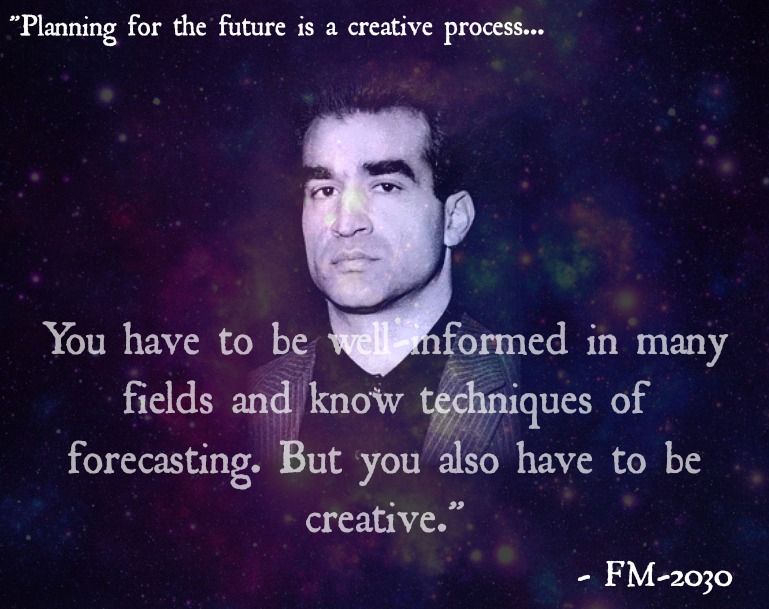Tag: innovation
Should We be Cautious about Envisioning Dystopias?
[youtube_sc url=“https://www.youtube.com/watch?v=oXNl-tiAdRo”]
How will our relationship to technology evolve in the future? Will we regard it as something apart from ourselves, part of ourselves, or as a new area of evolution? In this new video from the Galactic Public Archives, Futurist Gray Scott explains that we are a part of a technological cosmos. Do you agree with Scott that technology is built into the universe, waiting to be discovered?

How Creative Are You? Pt. III — Environment
One of the major aspects that can make or break a creative person according to FM-2030 is the environment. In his book “Are You A Transhuman?”, he asks the reader to grade their own surroundings: “Does your home environment stimulate innovation — cross fertilization — initiative?”
We bet you can see where this is going.
The answers are, once more, “Often, Sometimes, or Hardly Ever”, with “Often being the answer choice that gives you the most points — another 2 to tally up to your score if you’re already proving to be more transhumanist that you thought. It might seem obvious, but it’s true — environment can play a major role in the stimulation of creativity. FM says that “It is difficult to be precise about creativity — how much of it is inherited and how much is learned.” If an environment is one that “encourages free unrestricted thinking… encourages people to take initiatives… open and ever-changing”, it is a dynamic environment that can stimulate creativity in an individual.
People who work with telecommunications are susceptible to views that are far different than their own, and the sciences, though structured, force a person to think creatively to find answers. By the same token, people who have a good balance of leisure time and work are also cultivating a greater internal environment to stimulate creativity. And in case you were forgetting the reason creativity is important to FM-2030, perhaps take a look at his quote that sums up the chapter perfectly, below.
FutureMed: What is the future of Health?
This archive file was compiled from audio and video documentation of a gathering of medical professionals, inventors & entrepreneurs, held at Singularity University in California, February 2013. The selected material gives a portrait of a time in which the field of health found itself at a crossroads between the mature medical institutions which had slowly evolved over hundreds of years, and a need to develop and integrate new, more flexible and scalable forms of care. About Future Med: http://futuremed2020.com/ About Singularity University: http://singularityu.org/ GPA on Facebook: on.fb.me/18NiF8z GPA on Twitter: twitter.com/GPA2030
Marty Kohn, MD: Will your doctor be a Robot?
This archive file was compiled from an interview conducted on the campus of Singularity University, February 2013. The interview took place at a time where new artificial intelligence systems, such as IBM’s Jeopardy winning “Watson,” were re-awakening the popular imagination in terms of artificial intelligence becoming a visible part of day to day life. The privacy issues regarding the ‘big-data’ that allowed many AI systems to function was also becoming a significant source of controversy. In this piece, Marty Kohn, MD, chief medical scientist on the IBM Watson Medical Team, gives insight into his personal thoughts and feelings regarding how society might both accept and reject the artificial intelligence advances of the coming years.
About the Speaker:
IBM:
researcher.ibm.com/researcher/view.php?person=us-marty.kohn
FutureMed:
futuremed2020.com/marty-kohn/
Amit Singhal (at Google): Will your computer plan change your life?
This archive file was compiled from an interview conducted at the Googleplex in Mountain View, California, 2013. In the discussion, Amit Singhal, a key figure in the evolution of Google’s search engine, broadly outlined the significant hurdles that stood in the way of achieving one of his long-held dreams — creating a true ‘conversational’ search engine. He also sketched out a vision of how the initial versions of such a system would, and also importantly, would not attempt to assist the individuals that it interacted with.
Though the vision was by design more limited and focused than a system capable of passing the famous Turing test, it nonetheless raised stimulating questions about the future relationships of humans and their ‘artificial’ assistants.
More about Amit Singhal:
Wikipedia:
en.wikipedia.org/wiki/Amit_Singhal
Google Search:
en.wikipedia.org/wiki/Google_Search